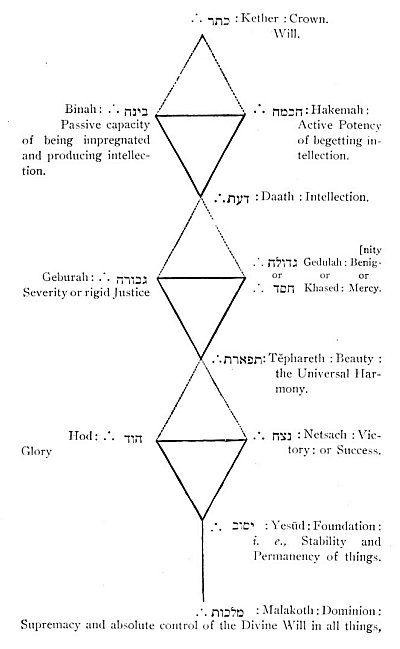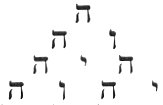The WORD of God, said the Indian philosophy, is the universal ‘and invisible Light, cognizable by the senses, that emits its blaze in the Sun, Moon, Planets, and other Stars. Philo calls it the “Universal Light,” which loses a portion of its purity and splendor in descending from the intellectual to the sensible world, manifesting itself outwardly from the Deity; and the Kabalah represents that only so much of the Infinite Light flowed into the circular void prepared for creation within the Infinite Light and Wisdom, as could pass by a canal like a line or thread. The Sephiroth, emanating from the Deity, were the rays of His splendor.
The Chaldæan Oracles said: “The intellect of the Generator, stirred to action, out-spoke, forming within itself, by intellection, universals of every possible form and fashion, which issued out, flowing forth from the One Source . . . For Deity, impersonated as Dominion, before fabricating the manifold Universe, posited an intellected and unchangeable universal, the impression of the form whereof goes forth through the Universe; and that Universe, formed and fashioned accordingly, becomes visibly beautified in infinitely varying types and forms, the Source and fountain whereof is one. . . . Intellectual conceptions and forms from the Generative source, succeeding each other, considered in relation to ever-progressing Time, and intimately partaking of THE PRIMAL ETHER or FIRE; but yet all these Universals and Primal Types and Ideas flowed forth from, and are part of, the first Source of the Generative Power, perfect in itself.”
The Chaldæans termed the Supreme Deity ARAOR, Father of Light. From Him was supposed to flow the light above the world, which illuminates the heavenly regions. This Light or Fire was considered as the Symbol of the Divine Essence, extending itself to inferior spiritual natures. Hence the Chaldæan oracles say: “The Father took from Himself, and did not confine His proper fire within His intellectual potency:” . . “All things are begotten from one Fire.”
The Tsabeans held that all inferior spiritual beings were emanations from the Supreme Deity; and therefore Proclus says: “The progression of the gods is one and continuous, proceeding downward from the intelligible and latent unities, and terminating in the last partition of the Divine cause.”
p. 743
It is impossible to speak clearly of the Divinity. Whoever attempts to express His attributes by the help of abstractions, confines himself to negatives, and at once loses sight of his ideas, in wandering through a wilderness of words. To heap Superlatives on Superlatives, and call Him best, wisest, greatest, is but to exaggerate qualities which- are found in man. That there exists one only God, and that He is a Perfect and Beneficent Being, Reason legitimately teaches us; but of the Divine Nature, of the Substance of the Deity, of the manner of His Existence, or of the mode of creation of His Universe, the human mind is inadequate to form any just conception. We can affix no clear ideas to Omnipotence, Omniscience, Infinity or Eternity; and we have no more right to attribute intelligence to Him, than any other mental quality of ourselves, extended indefinitely; or than we have to attribute our senses to Him, and our bodily organs, as the Hebrew writings do.
We satisfy ourselves with negativing in the Deity everything that constitutes existence, so far as we are capable of conceiving of existence. Thus He becomes to us logically nothing, Non-Ens. The Ancients saw no difference between that and Atheism, and sought to conceive of Him as something real. It is a necessity of Human Nature. The theological idea, or rather non-idea, of the Deity, is not shared or appreciated by the unlearned. To them, God will always be The Father Who is in Heaven, a Monarch on His Throne, a Being with human feelings and human sympathies, angry at their misdeeds, lenient if they repent, accessible to their supplications. It is the Humanity, far more than the Divinity, of Christ, that makes the mass of Christians worship Him, far more than they do the Father.
“The Light of the Substance of The Infinite,” is the Kabalistic expression. Christ was, according to Saint John, “the Light that lighteth every man that cometh into the. world”; and “that Light was the life of men.” “The Light shone in the darkness: and the darkness comprehended it not.”

Moe is the founder of GnosticWarrior.com. He is a father, husband, author, martial arts black belt, and an expert in Gnosticism, the occult, and esotericism.






